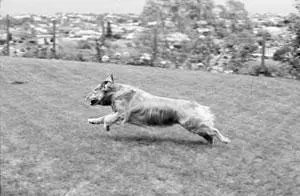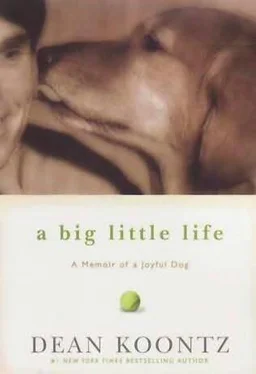Along came Trixie.

III anticipation, adventure, and anal glands
SHE ARRIVED WITH her name. Trixie. I joked sometimes that it sounded more like a stripper than a dog. They told us we could change it and that she could quickly be taught to answer to a new name. But if it sounded more like a stripper than a dog, it sounded more like an elf or a fairy than a stripper. Elves and fairies are magical beings; and so was she.
Trixie came to us not as a puppy but as a highly educated and refined young lady of three. As a consequence of elbow surgery, she had taken early retirement from a career as an assistance dog to a beautiful young woman, Jenna, who had lost both legs in a traffic accident. Trixie went into service just as Jenna began the student-teaching portion of her senior year at college, and made quite an impression in an elementary-school classroom.
Since 1990, Gerda and I have been supporters of the Southwest Chapter of Canine Companions for Independence. This remarkable organization raises and trains assistance dogs of four kinds.
A dog in a “service team” is paired with an adult or adolescent with physical disabilities-paraplegics, quadriplegics-and performs tasks such as calling elevators, opening doors, picking up dropped items that a person in a wheelchair can’t reach… Some adults who could not live alone before receiving a CCI dog achieve independence; children in wheelchairs gain confidence-and a new best friend.
In a “skilled-companion team,” a dog is matched with a child or an adult with a physical or developmental disability, and with that person’s primary caretaker, which is usually a parent. The dog helps with various tasks but primarily provides companionship, establishing a deep bond of love. The effect these dogs can have on an autistic child or one with cri du chat is nothing less than miraculous.
A dog in a “hearing team” alerts his deaf or hard of hearing companion to alarm clocks, smoke alarms, doorbells, and other sounds.
“Facility team” dogs are paired with teachers, rehabilitation specialists, or caregivers in hospitals, in classrooms full of kids with developmental disorders, in nursing homes… These dogs work miracles every day.
The assistance dogs given by CCI to people with disabilities do great work because of their training, but their most exceptional achievements may be a consequence of their qualities as dogs.
Tom Hollenstein, a friend and board member of CCI’s Southwest Chapter, suffered a major spinal injury in a bicycle accident when he was twenty-four. A tall, handsome, personable guy, Tom found himself in a wheelchair, living with his parents again. He is one of the most highly motivated people I’ve ever met, and he could not long endure a lack of independence. With his first assistance dog, Weaver, Tom took control of his life, moved out of his parents’ house into his own apartment, landed a job, and never looked back. Weaver was something special, and one of those human-dog bonds formed that was even deeper than usual. Tom has said that, given the choice of never having been disabled or never having known Weaver, he would choose the dog and therefore the spinal injury. Tom does not speak about such things lightly; he means what he says. He told me that when he lost his four-legged companion, he discovered, in his grief, depths of emotion that he had not realized were in him.
I first read about CCI when I was researching a novel, Midnight, that included a character in a wheelchair. I was so taken with the organization’s work that I specified the fictional dog, Moose, was CCI-trained. Midnight , my first book to reach number one on the best-seller list, caught CCI’s attention, and they asked if I would add a paragraph to the end of the paperback edition to promote them and to provide the address of their national headquarters in Santa Rosa, California. I was happy to oblige, and this led to our personal involvement with the Southwest Chapter, long before Trixie was born.
At two and a half, Trixie retired from her assistance work with Jenna, but at three, she became an assistance dog of another kind with Gerda and me. She mended us in many ways.
The director of the Southwest Chapter of CCI, at that time a woman named Judi Pierson, had often encouraged Gerda and me to take a release dog from their program. Not every puppy has the talent, temperament, or physical qualifications to get all the way through the two years of training that leads to graduation.
A puppy raiser, always a volunteer qualified by CCI, raises the dog from its eighth week, after it is turned in by the breeder. The puppy raiser, who has the dog for approximately sixteen months, teaches it to sit, stay, lie down, heel, walk on a loose leash, toilet on command, and other basic tasks.
Thereafter, if the dog has done well, it goes to the CCI campus for six months of more intense training, during which it will acquire more skills than I possess, a statement that anyone who knows me will confirm without hesitation.
If the dog fails out for any reason, it is offered to the person who raised it.
These folks are amazing. To rear and train one of these animals is to fall in love with it-yet these volunteers routinely return their charges to CCI for advanced training and often take another puppy, putting themselves through the loss again because they believe in this organization. Some have raised twenty or more dogs, and it is awe-inspiring to consider how many lives they have changed.
Sometimes the puppy raisers are not able to fit one more pooch in their house, or their circumstances have changed. Then a home must be found for the dog that is being released from the program.
Year after year, as Judi urged us to take a CCI release, we longed to say yes, but we were concerned that we could not give the dog the time and attention it needed. We kept telling Judi-and each other-that we were too busy, that we would have to wait until my writing career entered a quieter phase.
In August of 1998, I completed Seize the Night, the sequel to my novel Fear Nothing, one of many of my books in which a dog is among the cast of principal characters. Every time I wrote a story that included a canine, my yearning for a dog grew. Readers and critics alike said I had an uncanny knack for writing convincingly about dogs and even for writing from a dog’s point of view. When a story contained a canine character, I always felt especially inspired, as if some angel watching over me was trying to tell me that dogs were a fundamental part of my destiny if only I would listen.
At dinner one evening near the end of the month, I raised the subject with Gerda: “We keep saying we’re too busy to add a dog to our lives, but I’m afraid we’re going to be ninety years old and still too busy. Maybe we should just do it, busy or not, and make it work.”
We never had children. Since Gerda and I set up shop in 1974, we had been together every day, virtually all day, for twenty-four years. We were apart only twice in thirty-two years of marriage. We were a tight team, and we were daunted by the prospect of having another person in the house. We knew that a dog, no less than a child, would be a person.
At the end of dinner, we were agreed. We weren’t ready for a dog, but we were going to make ourselves ready.
In September, I called Judi and told her the next time they had a release dog to place, we would give it a home.
She said, “What kind of dog do you want-a mooshy one or a not-mooshy one?”
Because mooshy sounded slightly disgusting, I assumed I wanted a not-mooshy. Apparently, I was not as informed about dog terminology as I thought I was, so I decided to ask for a definition.
Читать дальше
Конец ознакомительного отрывка
Купить книгу













